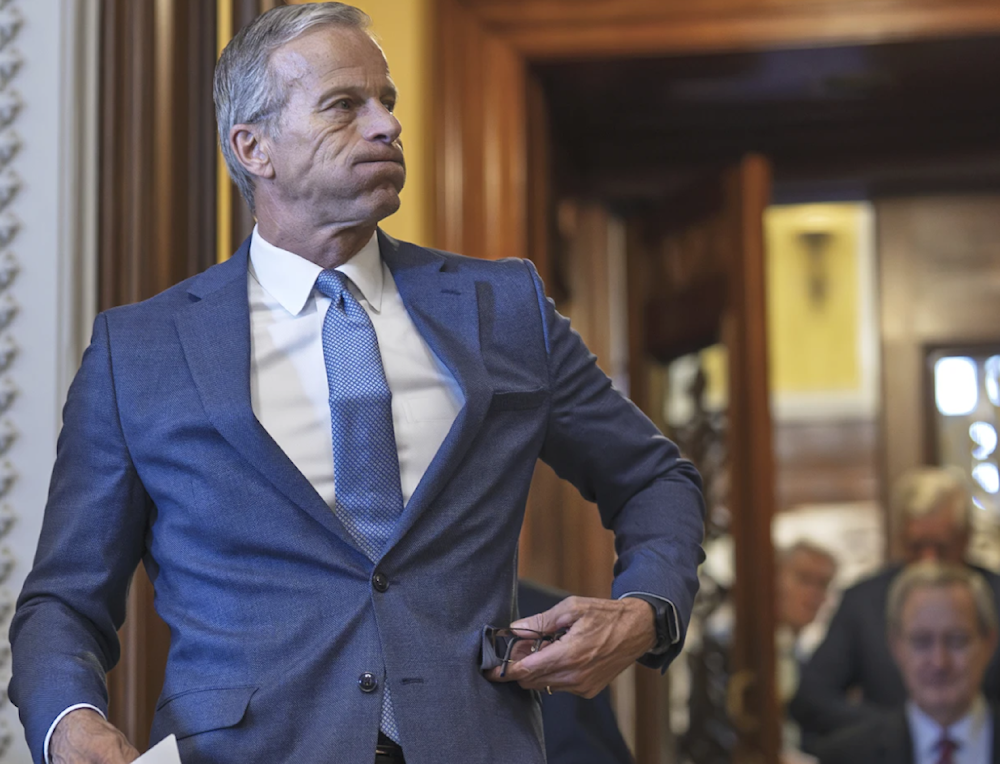Senate passes Trump's tax bill, sends it to House for final passage
Trump’s sweeping tax-and-spending bill extends 2017 tax cuts, boosts military and immigration spending, slashes social safety programs, and adds $3.3 trillion to the national debt.
-

Senate Majority Leader John Thune emerges from the chamber just after passage of the budget reconciliation package of President Donald Trump's signature bill of big tax breaks and spending cuts at the Capitol in Washington on July 1, 2025. (AP)
US Senate Republicans narrowly passed President Donald Trump’s sweeping tax-and-spending bill on Tuesday, in a dramatic 51-50 vote. Vice President JD Vance cast the tie-breaking vote, advancing a measure that would extend his 2017 tax cuts, boost military and immigration enforcement funding, and roll back social safety net programs, all while adding $3.3 trillion to the national debt.
The legislation now heads to the House of Representatives, where a few Republicans have already expressed concerns about specific Senate provisions. Trump hopes to sign the bill into law by the July 4 Independence Day holiday, and House Speaker Mike Johnson said he intends to meet that timeline.
Ballooning national debt
Key provisions of the bill include new tax breaks for tip and overtime income, nearly $1 trillion in cuts to Medicaid and food assistance, and the repeal of many of President Joe Biden’s green energy incentives.
The legislation, which has highlighted deep Republican divisions over the ballooning $36.2 trillion national debt, includes a $5 billion increase to the federal government’s self-imposed debt ceiling, a move Congress must approve in the coming months to avoid a potentially catastrophic default.
The Senate passed the bill by a narrow 51-50 margin, with Vice President JD Vance casting the tie-breaking vote after three Republican senators, Thom Tillis (NC), Susan Collins (ME), and Rand Paul (KY), joined all 47 Democrats in opposing the measure.
Marathon debate
The vote came after a marathon overnight debate, as Republicans clashed over the bill’s massive price tag and its implications for the US healthcare system.
Key last-minute negotiations focused on securing the support of Republican Senator Lisa Murkowski of Alaska, who had threatened to vote against the bill unless major changes were made.
The final Senate bill included key concessions that helped secure Senator Lisa Murkowski’s support: one provision boosts food-aid funding for Alaska and several other states, while another allocates $50 billion to assist rural hospitals in coping with the bill’s deep Medicaid cuts.
House faces tight vote amid intra-party tensions
The upcoming House vote, where Republicans hold a narrow 220-212 majority, is expected to be tight.
"It's a great bill. There is something for everyone," President Trump said during an event in Florida on Tuesday. "And I think it's going to go very nicely in the House."
The House narrowly passed an earlier version in May with just a two-vote margin. However, several House Republicans have already voiced opposition to the Senate’s version, which the nonpartisan Congressional Budget Office estimates would add $800 billion more to the national debt than the House-passed bill.
Republicans remain divided, struggling to reconcile conservatives’ push for deeper spending cuts with moderates’ concerns that reductions to Medicaid could negatively impact their constituents, especially in rural communities.
Hefty price tag
The House Freedom Caucus, a bloc of hardline conservatives, has sharply criticized the Senate version of the tax bill, particularly its hefty price tag. "There's a significant number who are concerned," said Rep. Chip Roy, a Freedom Caucus member.
At the same time, more moderate House Republicans, especially those representing lower-income districts, have pushed back against the Senate plan’s deeper cuts to Medicaid.
Adding to the challenge, a group of Republicans from high-tax states like New York, New Jersey, and California are demanding a more generous deduction for state and local tax (SALT) payments.
The legislation has also drawn fire from billionaire Elon Musk, a former Trump ally, who has denounced the bill’s massive cost and pledged to fund primary challengers against Republican lawmakers who support it in the upcoming midterm elections.
Democrats united in opposition; critics warn of long-term harm
"This is the largest assault on American healthcare in history," said House Democratic Leader Hakeem Jeffries. "It's the largest assault on nutrition in American history."
According to the Tax Foundation, the Senate bill would deliver some of its biggest tax benefits to the top 1% of US households, those earning $663,000 or more in 2025. The Congressional Budget Office (CBO) also projects that these high-income earners would benefit the most from the proposed tax cuts.
Poor Americans to get poorer
Independent analysts warn that tightening eligibility for food and healthcare assistance programs would effectively lower incomes for poor Americans while increasing their costs for basic needs. The CBO estimates that nearly 12 million people could lose health coverage under the Senate version of the bill.
Critics also note that the bill’s projected increase to the national debt would amount to a generational wealth shift, burdening younger Americans with slower economic growth, higher borrowing costs, and reduced public investment in the future.
Senate Democratic Leader Chuck Schumer condemned the vote, saying it "covered this chamber in shame," and blasted the bill for "ripping health care away from millions of Americans, taking the food out of the mouths of hungry kids."
Republicans, meanwhile, dismissed the Congressional Budget Office’s cost projections, arguing that the proposed Medicaid cuts would primarily eliminate “waste, fraud, and abuse” rather than reduce access to care.
Defending the bill, Senate Majority Leader John Thune said it would "permanently extend tax relief for hard-working Americans" and claimed it would help "spur economic growth and more jobs and opportunities for American workers."

 5 Min Read
5 Min Read










